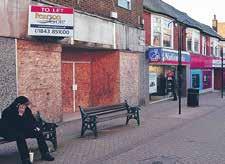
12 minute read
Jade Calder Interview with Professor Danny Dorling
orling d anny d nterview with Professor i
Jade Calder, History at St Peter's College
Advertisement
Professor Danny Dorling is a social geographer based at St Peter’s College. His research interests include income inequality and homelessness and he has published numerous books, including his most recent work, Finntopia, which argues that we ought to look to Finland and learn from its successes in social policy. I spoke to him recently about the effects of the pandemic, the Conservative government, the failures of the British left and the housing problem in Oxford. Before you proceed, please note that no offence towards the good people of Texas was intended.
CW: death, suicide
Could you please introduce yourself - explain your work and your academic interests for the readers of Look Left?
I’m Danny Dorling, I’m from the Geography department at Oxford University, and I've been doing Geography for 30 years, though just seven years in Oxford. For the last 20 years I've been looking at inequalities between people, between areas and between countries and how they've been changing.
You focus on inequalities a lot in your work, so what do you think the most obvious truths about social inequality in the UK are which have been laid bare by the Covid pandemic?
We have enormous ignorance of our inequality in Britain; it’s quite staggering. Few people know that the UK is by income inequality the most unequal country in Europe. I often say that we’re like the Texas of Europe if you think about how people stereotype Texans as having a rather brash way of behaving!
There was an article in the BMJ and what they said was this: “the pandemic has seen an unprecedented intergenerational transfer of harm and costs from elderly socio-economically privileged people to disadvantaged children”. This disease has hit the oldest the most but the better off tend to live 10 years or more than the worst off, so if you have a disease that hits people in their 90s more it will actually hit the middle class more. We’ve done not everything but quite a lot to protect this group like shut down schools which has had massively damaging health effects on children.
In the 2019 election many less well-off communities voted the Tories in. Do you have any faith that the Conservative government will do anything to ‘level up Britain’?
What people often don't realise about the Conservatives is that they're not always lying. Sometimes they actually believe they've done something good. Yes, there was quite a lot of lying with the Conservatives, but they also fool themselves, they actually think they make lives better. They don’t. I’ve spent 30 years measuring this, and we've got international studies telling you how more people kill themselves when the Conservatives are in power than when Labour is, all else taken into account. There's huge amounts of evidence that the Conservatives are damaging to society.
On the ‘red wall’, I published something on this in January last year: it's the posher northern seats that went. When you look at almost all the seats that flipped, they had three affluent neighbourhoods in the best fifth of British society - they have retirement areas with better off people in them. It wasn’t the poorer parts of Liverpool or Newcastle, it was the more rural northern areas which often included people who had retired from the South back to the North because it was cheaper, so it’s not quite so cut and dried.
I'm not completely cynical about what the Tories might do because I think that they may be forced by circumstance in a way to level up, partly by not having enough money to spend on the South. It's going to be very hard for them to do things like take the £20 a week extra on Universal Credit back - they've got problems with mass evictions of poor families, and they can't really start workhouses again to put evicted children into. They may be forced not to be as bad as they normally are because of the circumstances we're in - it's sort of like an echo of what happened in the 1920s when things began to get more equal - that's the last time we had a turning point. We’re at a peak of inequality now - we're the most unequal country in Europe. Inequality has been rising since 1970s, but it may turn. The last time it turned was 100 years ago after WW1 and we became progressively more equal. We didn’t immediately notice because the first two decades of becoming more equal are just a painful, awful mass recession.
I have been saying that we're in weird times and the Conservatives have been forced sometimes to do some things which they usually wouldn’t want to. A great example of that is Keir Starmer coming out in favour of a lower rate corporation tax than the Conservatives. A nice potential indicator of peak inequality is when you actually have the Conservatives potentially being more progressive on something than what Labour is willing to say publicly.
The flip side question to the previous one is: a year into Starmer’s leadership, what is your assessment of the Opposition?
My general assessment of Labour is fairly damning. To become the most economically unequal country in Europe, which we did from the 1970s onwards... yes, it requires a devious Conservative Party, but they're not that clever. So sadly, one of the reasons why Britain's in such a terrible state is that we have had, since the late 1970s, a pretty dismal left wing / social democratic party compared to a standard European country and the left there. Angela Merkel's policies are left of Jeremy Corbyn in what she actually does and the amount of public money she's willing to spend compared to in Corbyn’s manifesto.
And it's really interesting to ask how come the living standards of people on benefits have halved since I was a kid. Obviously, it's a terrible record, and we can't put it down to the world's most successful Conservative Party. They're not geniuses, we can't lay it on them; it is the sad failure of solidarity on the left. So get
Jade Calder (right) interviewing Prof Dorling over Zoom, February 2021 your message out Starmer, I'm not impressed. But it's part of the 40 years of ‘not impressed’, and there must be an underlying reason about why the left has so few people to draw on; why it can't get its act together, why it failed to do things like bringing proportional representation in the last 40 years so that it would be utterly split between the SDP, the Liberal Democrats, the Greens...
This is an oddly divided country by class, and the middle class are going to be hurt by the outcome of this pandemic, recession, Brexit.... the middle class were hurt in the 1930s as well; by the end of 1930s they couldn't afford a private doctor, which is partly why we got the NHS. Labour tells itself myths about things. It wasn't just a miners' leader who got us the NHS, middle class Beveridge was a liberal. When Labour does well is when you have a hurting middle class and a movement towards greater equality, and that's when Labour did well in 1945 and again in the 1960s.
Ideally for a normal European country you'd have two Labour parties. You'd have a left one and the right one, and you'd have PR so it wouldn't matter. You can't have a party of this breadth from Tony Blair mild conservatism through to Trotskyists, but without PR you have to have it.
In 2014 the Conservatives stopped being a conservative party. I think it's the year in which Cameron agreed that in the European Parliament, the Conservatives no longer belonged to the European People's Party, the European conservatives. They would join with other groups, including Alternative for Deutschland - our Conservative MEPs joined the far right in the European Parliament. So we have a far right party in power, and when your main political party becomes a far right populist party, Labour is left to house everybody else. Again, we’re like the Texas of Europe. Things are pretty bad here, but one of the worst things is that we don’t even know how bad they are.
As I'm sure you know quite a lot of university students have taken part in rent strikes this year - as an academic yourself, what's your view on these?
pay hardly anything or even nothing. Cancelling student debt is hardly radical when you remember that every political party apart from Conservatives are in favour of this.
On rent: if you're in Scotland, Scottish law is different - you just simply tell your landlord you're not paying. You have the ability to just walk out with four weeks notice, which is what students in Scotland have done. In England we need to know what's possible in Scotland and then ask why we don’t have it here.
It's normal in Scotland and the rest of Europe to go to university locally. In general it’s normal to stay at home - this idea that we need to create extra bedrooms for people all around the country so you can go and have the student experience is not that green. If we were to do all of that you have a much cheaper university experience because you don't need to do things in the way we've chosen to do them. The problem in Britain is the vested interest in money. I can remember in 2008 when I had my first PhD students and one worked in the higher education sector. And he said to me, “Danny, we're about to create a market that's bigger than the entire oil and gas market in Britain”, and that market is the fees of students and their rents.
The rents that you're paying have been entirely constructed by a process over those decades of inflating the cost of housing. I've had people high up in the Treasury tell me that the government views the cost of housing in London as a measure of their economic success. The more expensive London is, the better it is doing because London can only be that expensive because people can afford to live there. Now, if you've got a set of ministers who see high house prices and higher rates as a sign of success, you've got a problem.
You've written about and spoken about the homelessness issue in Oxford in particular. I was wondering if you find that people have a kind of mental disconnect between the rough sleepers they see on the street and the causes of homelessness?
Oxford City Council got a shock when it found that a large number of the homeless people dying had grown up here - the homeless people more likely to die here are the ones who grew up here. If everything falls apart in your life you end up gravitating towards the place near to where your school was, then you run out of favours from old friends and then you end up on the streets.
I became interested in housing because 20 years ago we did a paper about the causes of deaths of young people in Oxford, and I got the shock of my life when we actually discovered that the main reason was homelessness. The deaths were especially around a place called Simon House quite near the centre of town; for under 65s the excess deaths were within the same ward as Christ Church, around the homeless hostels. We repeated that analysis last year and the situation had become even worse. "We’re not going to get an 18 year old now at Oxford who’s looking up at Boris and thinking he’s doing a brilliant job and that he will one day be prime minister"
It's much easier if you've known people who've been homeless, and the other thing that's hard is that often, people's experiences of street homelessness are with the most confident street homeless person, the person who's willing to sit in the most obvious place and willing to talk. It's not with a person who's crying around the corner, that's what you don't see. People get the wrong perceptions which are based on a tiny subset.
The universities and hospitals in Oxford basically colonised working class housing - 10 years ago that ran out and what happens then is that every last scrap of housing ends up being used in the city. The expansion of the universities and everything else in a city that's not allowed to grow means that the worst little hovel now has an American PhD student with a trust fund living in it, and one of the reasons why people are dying on the streets of Oxford who grew up here is because we have extremely rich people from abroad living in the property that they would have lived in. There's a direct connection between the growth of the universities, not allowing Oxford to grow, not building any more housing and so on and the homelessness. If you become a growth area like this without planning and if the underlying assumption is “don't worry the market will sort it out, it'll all reach an equilibrium”, well we're playing a game of seeing what happens if you do that.
What is one thing that you would like the readers to go away and do?
Imagine that they’d been born in another European country, then think “what would have most likely happened to me; how would my schooling have been different, how would my choice of going to university been different?”
To what extent are they a product of the time and place where they grew up, and how can they factor that in to not repeat the mistakes of the past? I did a 200 year long series where I take each prime minister when they were 18; with Boris Johnson he looked up to Margaret Thatcher; when she was 18 she looked up to Winston Churchill. And you can do it again and again and again. This will end. We’re not going to get an 18 year old now at Oxford who’s looking up at Boris and thinking he’s doing a brilliant job and that he will one day be prime minister. This will end, partially because of numerical reasons and there’s so many more universities now. It won’t be a PPE student from Oxford who’s prime minister in 40 years’ time.
Try and think how it would have been different somewhere else and then try and be that person. It’s a bit like saying to somebody from Texas to try and imagine growing up somewhere else. Don’t spend the rest of your life necessarily trying to be a Texan.










